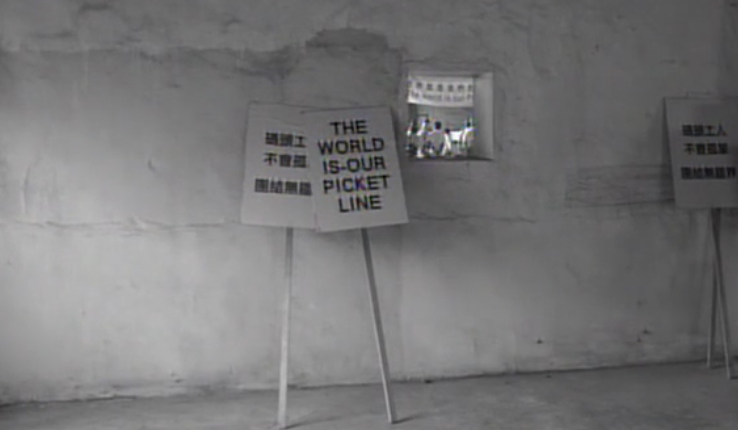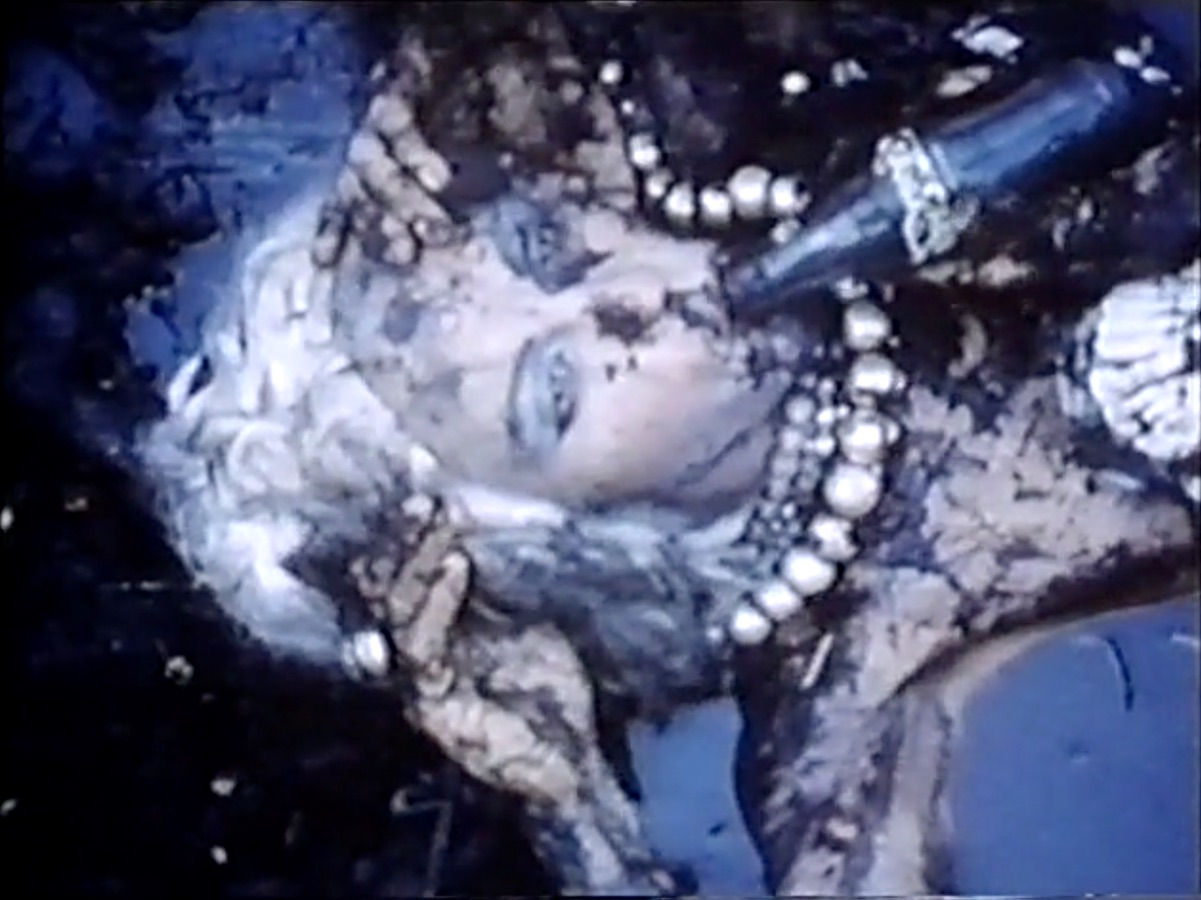What do the worlds of Jack Smith and striking Taiwanese dockworkers have to do with each other? Birgit Hein’s Jack Smith (Germany, 1974, 10 min.) and Chen Chieh-Jen’s The Route (Taiwan, 2006, 17 min.) are produced more than three decades apart, and could not be more different in tone, form, and content. It is admittedly an odd pairing, with the films circulating differently in queer studies and Asian studies. And yet when viewed together, the films make an interesting case for thinking about how queer fabulations and transnational worker solidarities can be imagined together as resistance. The critical affordances of gesture and impulse, big or small, call on us to question power’s sedimentation as a plot. And as power is a plot, the story can be rearranged and retold for a different effect.
Hein’s film explores the queer fabulations of underground artist Jack Smith in a loose tripartite structure that moves from the swamp to the zoo to the museum. Each sighting is a fabulous encounter, beginning with a drag mermaid (Mario Montez) cavorting with male nymphs in the muddy swamp and ending with a fantastic character played by Smith himself performing various acts of dissent. Wearing a multicolor feather hat, he is seen writing checks to animals at the Cologne zoo and to himself while ranting about art’s capitulation to commodity fetishism. He has no time for the safety and sterility of the rich. This refusal to be held hostage by capitalist logics and norms is evident in his low-budget production with a sense of paratheatrical poverty. One may read his pugnacious stance against polish, resolution, legibility, and self-congratulation as fundamental to non-representational forms of resistance. Smith’s way of being “political” questions the frame of resistance itself. We get away from a kind of ontological oppositionality, and Smith instead proliferates being, speaking, and doing differently. It imagines a poetics of resistance that has less to do with the liberal choice of an individual than a radical critique of the options from which “we” choose.
As the ostensible subject of Hein’s film, Smith is not so much a model of exceptional resistance as he is presenting a way of resisting and being. To put it another way, resistance is an aesthetic with myriad forms, which one can practice while being singular plural, to invoke Jean-Luc Nancy’s term describing ways to speak of a “we” without relapsing into an exclusive identity. In this regard, we see how choice is itself being interrogated as a form of agency in the mermaid’s wild ecstasy, and in the feathered man’s alternately futile and promising speech acts. These are actions toward a different kind of life rather than the one mandated by the colonial market involving indentured servitude and violent dependencies. This kind of poetic resistance–resistance performed with queer dirt and strange sightings–continues to be much less popular in or even legible to mainstream expressions of dissent. Often, to resist in popular terms is to adopt an oppositional stance that is relatable, ethical, and couched in the binary terms of a political struggle. Distaste or degeneracy is out of the question.
But disgust against the capitalist machinery is all too real even if there is not a defining dissent. While the poetics of resistance imagined by Smith in the 1970s are a “disgusting performance,” Chen’s film expresses its disgust through an aesthetics of volition around workers’ rights. Its moody staging of a fictional protest in Taiwan was inspired by the Liverpool dockers’ strike of 1995 against the massive layoffs of union dockers. Rendered in black and white, the retrospective protest recuperates the lost opportunity for transnational solidarity among dock workers in three continents.
Under Margaret Thatcher’s neoliberal regime, all British ports had become privatized. In 1997, two years into a dock worker strike that was initiated in response to layoffs, scabs in the UK loaded up a cargo ship called the Neptune Jade. When the Neptune Jade arrived at its destination in Oakland, Oakland International Longeshore and Warehouse Union (ILWU) workers set up a picket line and refused to cross it to unload the ship. Dockers in Canada and Japan followed suit, and the ship eventually docked at the Port of Kaohsiung in Taiwan. Unaware of the global picket line, the Taiwanese workers unloaded the ship, which was subsequently auctioned off with its goods in Taiwan. In an ironic twist, Taiwan’s port was itself privatized shortly after. Years later, the workers learned about the incident they missed and decided to do a retrospective “film action” to set up the picket line.
Through carefully choreographed movements, the Taiwanese dock workers pick up signs that they pass to each other as they stand in the formation of human picket lines. The re-enactment is a historical “corrective” of the violence of neoliberal forgetting and dispossession. It is also a reinstatement of protest in memoriam of lives that were lost to privatization, showing how performative gesture can produce agency.
As I watched the two experimental films in the rising tide of dissent in Trump Nation, I was struck by their visual kineticism, the way that resistance can be differently rendered in queer, poetic, and choreographic moves. These moves are at once revelatory and pedagogic, sublime or pragmatic, giving life to projects that were never deemed viable or essential. These low-budget extravanganzas are critical gestures, impulses and expressions that make do with scarce resources, but make out with an abundance of color, wildness, and fabulosity. Smith’s drag mermaid costume, for example, is made of “two plastic ashtrays and two plastic tablecloths” sewn together, while the workers’ placards are put together with simple printouts and plywood. They remind us that found objects, simple gatherings, aspirational excess, and queer aberrations are sometimes all we need to survive, thrive, and resist with style.
The films’ instigation for imagining a different world is barely contained within the affective contrivances of an “objective” documentary frame, whether it is the accidental camp of Hein’s detached voiceover in German–“This mermaid’s name is Mario Montez. The drag queen is the star of a film, begun in 1963, called Lucky Landlordism of Taboo”–or Chen’s use of silence and collective gesture to convey the disgust of the Taiwanese dockers, and by extension, dockers around the world sabotaged by the neoliberal privatization of ports. They suggest the way that power regimes deform life while claiming otherwise, and the way that stories are told both have fundamental effects on how we live or die. But rather than being led by the nose, the films ask us to bear witness, document, make art, and produce more life with drag mermaids, swamp nymphs, feather hat-wearing ranters, striking workers, and experimental artists who are not afraid to think, dance, protest, and resist with imagined solidarities. Considering the times in which we live, this disruptive aesthetic is in and of itself an elixir of life.



